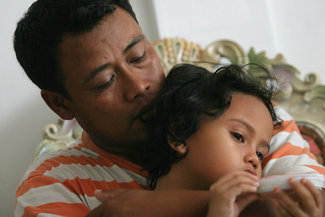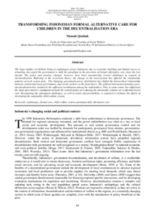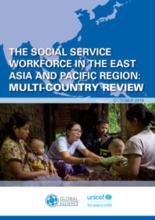

Displaying 181 - 190 of 752
This essay by Amelia Harvey for the ASEAN Studies Center focuses on the rise of orphanages in Cambodia and the manner in which voluntourism has accelerated this growth.
The authors of this study conducted qualitative interviews of 69 caregivers in four countries: Ethiopia, Kenya, Cambodia, and India (Hyderabad and Nagaland), and across four religious traditions: Christian (Orthodox, Roman Catholic, and Protestant), Muslim, Buddhist, and Hindu. They asked respondents to describe the importance of religion for their becoming a caregiver, the way in which religion has helped them make sense of why children are orphans, and how religion helps them face the challenges of their occupation.
Family Care First (FCF) | REACT is recruiting a Communication Specialist who will be responsible for the implementation of the network's communication strategy.
The United Nations Children’s Fund (UNICEF) in Vientiane, Lao PDR is looking for a qualified Individual International Consultancy for Development of the National Alternative Care Guidelines for children in Lao PDR and government training modules.
This article describes the challenges in changing policy and practice in the provision of formal alternative care in Indonesia.
This brief presents the key findings from the LEGACY Program Randomized Controlled Trial. The Legacy Maternal and Child Cash Transfer (MCCT) aimed to improve nutrition outcomes for mothers and children through the delivery of nutrition-sensitive cash transfers to pregnant women in Myanmar during the First 1,000 Days.
This experimental evaluation of the LEGACY program - a program implemented in three townships across Myanmar’s central dry zone that provided monthly cash transfer to mothers in their last two trimesters of pregnancy until the child turns two years old, as well as a monthly Social and Behavioral Change Communication (SBCC) activity supplementing the cash transfers, covering a range of topics related to nutrition and child health - measures the program's impact on child nutrition.
This video segment from the PBS Newshour shines a light on efforts underway in Cambodia to reintegrate children from orphanages back into their families or into family-based care.
Care for Children is seeking to appoint a consultant to undertake an end-of-project evaluation of a three-year project (January 2017 - December 2019): Care for Children's 'Vision for a Million' National Foster Care Projects in China and Thailand.
The first multi-country review of the social service workforce in the East Asia and Pacific region was prepared by the Global Social Service Workforce Alliance (GSSWA) and the United Nations Children’s Fund (UNICEF) East Asia and the Pacific Regional Office (EAPRO) with the support and contribution of many people throughout the region. This report is one of several regional reports being produced by GSSWA and UNICEF to increase the availability of information on the social service workforce, and provide a baseline from which to consider ongoing workforce strengthening initiatives.




